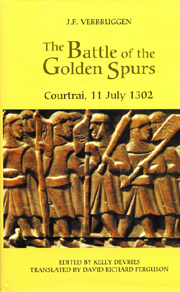 The Battle of the Golden Spurs (Courtrai, 11 July 1302)
The Battle of the Golden Spurs (Courtrai, 11 July 1302) Book contents
- Frontmatter
- Contents
- List of Illustrations
- General Editor's Preface
- Editor's Introduction to the 2002 edition
- Foreword to the 1952 edition
- Acknowledgements (to the 1952 edition)
- Preface: ‘An almost impossible event …’
- Introduction
- Part One Historiography and the Study of the Sources
- Part Two Historical Overview of the 1302 Campaign
- General Conclusion
- Bibliography
- Index
Introduction
Published online by Cambridge University Press: 12 September 2012
- Frontmatter
- Contents
- List of Illustrations
- General Editor's Preface
- Editor's Introduction to the 2002 edition
- Foreword to the 1952 edition
- Acknowledgements (to the 1952 edition)
- Preface: ‘An almost impossible event …’
- Introduction
- Part One Historiography and the Study of the Sources
- Part Two Historical Overview of the 1302 Campaign
- General Conclusion
- Bibliography
- Index
Summary
Flanders at the End of the Thirteenth Century
From the tenth century to the beginning of the fourteenth century, Western Europe experienced steady progress in all spheres of the economy. The population grew steadily, thus increasing the number of both consumers and workers, as well as encouraging trade and industry. At the beginning of the period, almost all of the population lived from agriculture and was settled in the countryside; at the end, a considerable number lived in the towns. Trade and industry had grown markedly since the eleventh century, giving rise to increased prosperity in which the inhabitants of the small towns, villages and countryside shared. Land was continually being won from the sea, marshes drained, desolate ground and pasture cultivated. Where once there had been forests, there was now arable land; much progress had been made in agriculture. These four centuries of continual advance did have their crises: famines, epidemics, floods, and so on, but the disasters were, nevertheless, limited geographically and could not interrupt the general course of progress.
The fourteenth century contrasted sharply with this. Repeated famines and epidemics devastated the whole of Western Europe. A widespread famine arose in 1315 and raged until 1317. The Black Death claimed thousands of victims from 1347 until 1351. Only a few regions avoided the direct consequences of such disasters. The general crisis that thus arose was felt everywhere. Unlike in earlier periods, there was no growth in population, not even in the towns; and scarcely any new arable land was won.
- Type
- Chapter
- Information
- The Battle of the Golden Spurs (Courtrai, 11 July 1302)A Contribution to the History of Flanders' War of Liberation, 1297–1305, pp. 1 - 26Publisher: Boydell & BrewerPrint publication year: 2001
